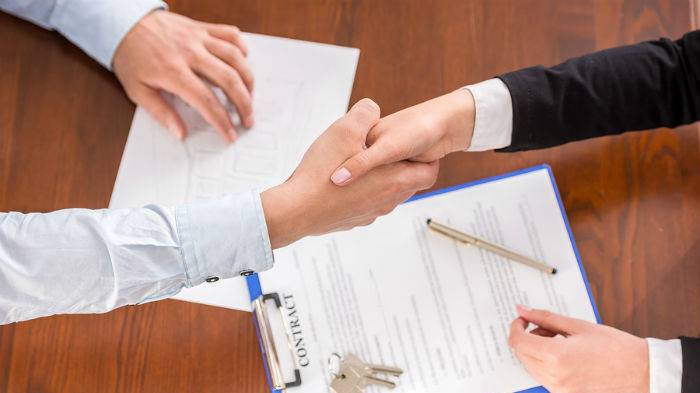What is the exchange of contracts meaning, and why is it so important? This stage is part of the final, crucial steps before your house is officially yours. Until this exchange happens, either the buyer or the seller can pull out of the deal. Once the contracts have been exchanged, a withdrawal by either party might constitute a breach of contract.
We take you through what happens next.

Get more information about mortgages
Your home/property may be repossessed if you do not keep up repayments on your mortgage.
Exchange of contracts meaning
The exchange of contracts is the critical moment in the home-buying process where the agreement to transfer property ownership officially becomes legally binding.
Key Details
-
Legal Obligation: Once the exchange has occurred, both the buyer and the seller are legally obliged to complete the property transfer on the agreed completion date.
-
Deposit at Risk: Before the exchange, either party can typically pull out without penalty. However, after the exchange, withdrawing from the purchase is extremely difficult and usually results in the buyer losing their deposit.
-
The Process: The buyer and seller sign identical contracts, which are held by their respective solicitors. The exchange involves the solicitors swapping these signed contracts, thereby activating the legal commitment.
-
Getting the Keys: The exchange solidifies the agreed completion date, which is the day the sale is finalized and you officially get the keys to your new home.
-
Impact of a Property Chain: If you are part of a property chain, the solicitors will not usually release the funds or complete your exchange until everyone in the chain is ready and agrees, meaning a delay anywhere in the chain can hold up your exchange.
How to prepare for exchanging contracts
The exchange of contracts is largely dealt with by your solicitors, so they should make sure everything is covered beforehand. But things to check are:
-
You have a mortgage offer from your lender in writing (this doesn't apply if you're a cash buyer)
-
Valuation and survey's have been completed
-
Searches have been completed by the conveyancer
-
You know what's included in your offer (i.e. furniture and fixtures)
-
You've got buildings insurance
-
A completion date is agreed
-
Your deposit has been transferred
-
You've signed the contract
The process of exchanging contracts
There's a lot to prepare before exchanging contracts. But here's a quick step-by-step overview of what you'll experience during the exchange of contracts process:
- Take the time to carefully read the contract. It's legally binding so you need to make sure you understand what you're agreeing to.
- If you notice something in the contract you don't agree with, inform your solicitor.
- The solicitors' set up a phone call with each other to address the contract and discuss any issues.
- Once both parties have agreed, the seller's solicitor sends the contract to the buyer's solicitor to sign.
- The contract is signed and returned to the seller's solicitor.
- Pay the deposit to your solicitor, who'll transfer the money to the seller's solicitor for holding.
- Both solicitor's agree on a completion date.
Once the exchange of contracts has taken place, both parties are obliged to honour it.
If you pull out, your deposit can be forfeited. If the seller pulls out they could be liable for your costs, including your conveyancing, solicitor’s and survey fees.
That’s why neither party should sign and exchange contracts until absolutely everything has been agreed.
When does exchange of contracts happen?
Contracts are typically exchanged between 7 to 28 days prior to the completion date.
But it may take even longer depending on the size of your chain.
What time of day does exchange of contracts happen?
There's no exact time of the day for this, it's based on your solicitors schedule.
You can experience a delay if the solicitors have a conflict in their schedule and can't find a time to agree on a completion date. There may even be a delay in exchanging if there are issues with either party on the details of the contract.
“The bigger the chain, the longer it can take for contracts to be exchanged. For example, if Person A is selling to Person B who’s selling to Person C, that would create what’s called a ‘2 property chain’. Person C in this situation would be called a ‘chain free buyer’. Person A has to wait until Person C is ready before they can complete an exchange with Person B.”
What our mortgage expert says:

Can you exchange and complete on the same day?
Technically, yes, although it can be a bit of a logistical nightmare.
It’s not until the contracts are exchanged that you know for certain that you've got your new property.
And it's unlikely that the seller's made any plans to leave the property until the exchange of contracts has happened. They’ll usually need time to pack and get ready to move.
Who holds the deposit on exchange of contract?
The seller's solicitor holds on to the deposit until completion.
When legal documents are sent confirming the exchange, the buyer's solicitor arranges to send over the deposit to the seller's solicitor.
Once the deposit has been transferred to the seller's solicitor, you likely won't get your money back if you suddenly change your mind.
What happens after you exchange contracts?
The good news is that you’ve done the hard work – legally, if not physically!
You can now look forward to getting the keys to your new home on completion date.
Your solicitor or conveyancer should register the transfer of ownership with the Land Registry. If you have a mortgage, they’ll send a copy of the title deeds to your lender who keep it as collateral until you pay off your loan.
You can get started with booking a removals company, redirecting mail, contacting utility companies and arranging home insurance.
Take a deep breath, safe in the knowledge that the home is now guaranteed to be yours.








